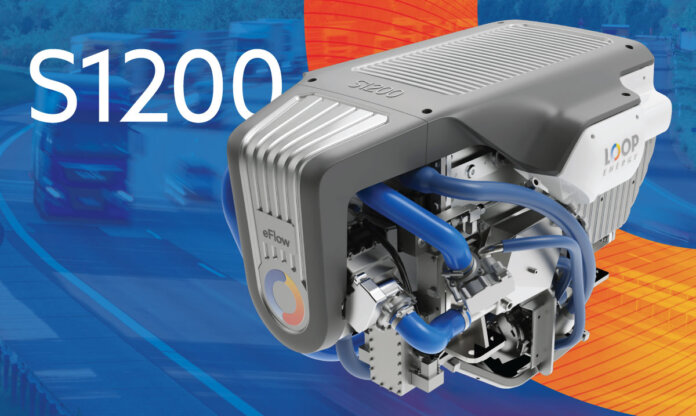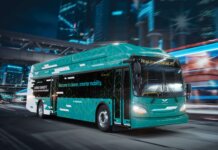Loop Energy, a designer and manufacturer of hydrogen fuel cells for commercial mobility, has unveiled its 120 kW fuel cell system, the S1200, which is built on Loop Energy’s existing technology to provide an additional efficiency gain of 20% when it generates electricity.
The S1200 is designed to deliver up to 60% in net system efficiency, enabling an electric vehicle (EV) powered by a Loop Energy fuel cell to deliver up to 54% fuel-to-wheel efficiency compared to the typical fuel-to-wheel efficiency delivered by a diesel vehicle (20% to 25%).
Loop Energy has achieved this efficiency gain because of its patented eFlow fuel cell architecture. Specifically, Loop Energy uses a signature trapezoid plate with narrowing channels for its bipolar plates, which increases gas velocity down the plate to deliver superior performance for fuel efficiency and power output.
For fleet managers, operators of commercial vehicles and the wider hydrogen infrastructure market, that means less hydrogen fuel used per kilometer, lowering the total cost of ownership of hydrogen-electric commercial vehicles.
Fuel costs make up roughly half of the total cost of ownership for heavy-duty hydrogen vehicles, which makes advancement in fuel efficiency a significant factor in creating a tipping point for commercial transition from diesel to clean fuels.
The S1200 is specifically designed for medium- to heavy-duty commercial vehicles. It is delivered as a complete fuel cell system, which simplifies and quickens integration for vehicle OEMs, and makes it a ready-to adopt solution for heavy-duty transportation and power system applications.
“With the launch of our new fuel cell system, we are proud to be leading the way in making transport electrification economically viable,” says Ben Nyland, Loop Energy’s president and CEO. “The S1200 brings world-leading fuel efficiency levels for medium to heavy-duty vehicles, crucially making the total cost of ownership lower and bringing fuel cost parity forward by four to eight years.
“We are keen to work with OEMs, governments and the wider hydrogen industry to help meet zero-emission targets,” Nyland adds. “We strongly believe that energy transition must happen now, and hydrogen fuel cell technology is in prime place as an alternative to diesel-powered vehicles.”
“Very happy to see Canadian companies such as Loop Energy leading in the global clean energy sector,” comments Canadian Minister of Environment and Climate Change, Steven Guilbeault. “They are creating sustainable jobs for workers, while contributing to our global climate objectives and a better future for everyone.”






